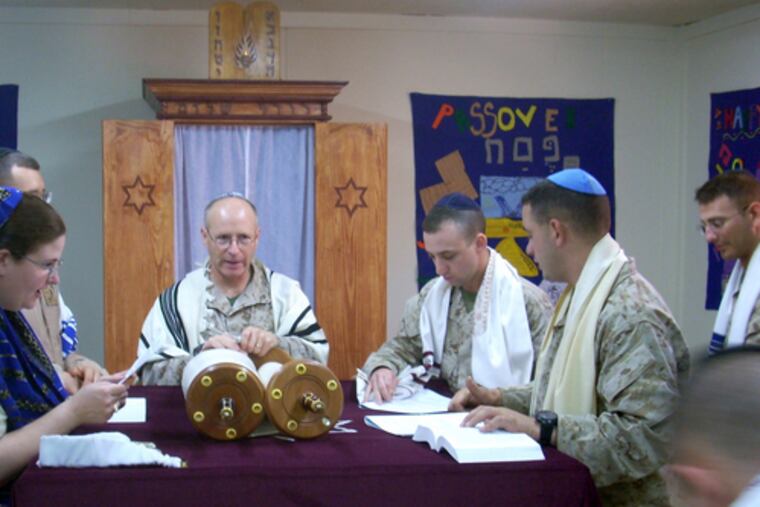Stu Bykofsky: Thanks to the Navy, there's a rabbi in Iraq
WHAT'S A NICE Jewish Philadelphia boy doing in Iraq? In the Navy? Heading the only functioning synagogue in the entire nation?

WHAT'S A NICE Jewish Philadelphia boy doing in Iraq?
In the Navy?
Heading the only functioning synagogue in the entire nation?
The answer is that Rabbi Jon Cutler is serving his country, and his people, as a Navy chaplain in an Iraqi desert, which is not exactly Palm Springs.
It was a long road from West Oak Lane, where he was born, and from Warrington, Bucks County, where has he headed the Tiferes B'nai Israel congregation, to the Al-Asad Air Base, in western Iraq. A reservist, Cmdr. Cutler, 52, arrived last January and is serving a 13-month tour before flying home in February. When we spoke on the phone Tuesday - 1 p.m. Philadelphia time, 9 p.m. Iraqi time - Cutler was preparing for Hanukkah, the Jewish Festival of Lights.
Excluding our military, there are maybe 100 Jews in all of Iraq, where Jews had lived for 2,600 years. Before World War II, Cutler says, 25 percent of Iraq was Jewish, as much as 40 percent of Baghdad. Almost all ran, or were expelled, in 1948, after Israel was created.
Western Iraq is assigned to the Marines, part of the Navy. The U.S. Army has the rest of Iraq. Cutler describes the situation in his area as calm, with the 10,000-person base located "in the middle of nowhere. Outside the gate, there is nothing" but a barren desert, more like Arizona's rocky Sidona wilderness than Saudi Arabia's sandy nothingness.
Although it would seem to be a tough place to run a synagogue - located in an annex to the chapel - Cutler is happy about his assignment.
"We have been averaging 15 people at Friday-evening services each week" in the synagogue, called Rodef Shalom, followed by a traditional Jewish meal, he says. "People back in the States have been sending over food such as salami, smoked salmon, hummus, challah."
The support comes from synagogues, Jewish organizations and individuals, who spent thousands of dollars to make sure personnel - Marines, Seabees, Army, civilian contractors - get Jewish food every week.
He chuckles that Americans ship hummus to the Mideast, which is like sending ice to Alaska.
To prepare for Hanukkah, which this year begins on the evening of Dec. 21, Cutler ordered up a large menorah.
Contractors built it for free at a carpentry shop on the base, he says. "I put in a work request, gave them a design, and they built it."
When Hanukkah arrives, "the entire base will be invited," Cutler says. "They will be served potato latkes [pancakes] and be given dreidels [children's spinning tops] and Hanukkah gelt [money]. The last night of Hanukkah [Dec. 28], the Jewish community will have a Hanukkah party."
Relations between Jews and Christians in the military are "great," says Cutler, who has met no Muslims while in Iraq.
A high point of his week is Sunday afternoon, when he and an Episcopal chaplain lead Bible study together on the Book of Genesis. "He gives the Christian interpretation and I give the Jewish interpretation," says Cutler. Commonalities rather than differences are explored.
This dialogue, he says, is "part of the strength of our country, the respect for people with different beliefs."
Cutler was surprised to find "a real yearning and need to connect among the Jewish personnel. They attend services and Torah-study sessions because they are questioning their faith and want to be more grounded."
He also found a "significant number of non-Jews attending services and Jewish-study sessions," some interested in converting, others out of curiosity. "I never would have suspected non-Jews wanting to check out Judaism."
When you're running Iraq's only synagogue, anything is possible.
E-mail stubyko@phillynews.com or call 215-854-5977. For recent columns: